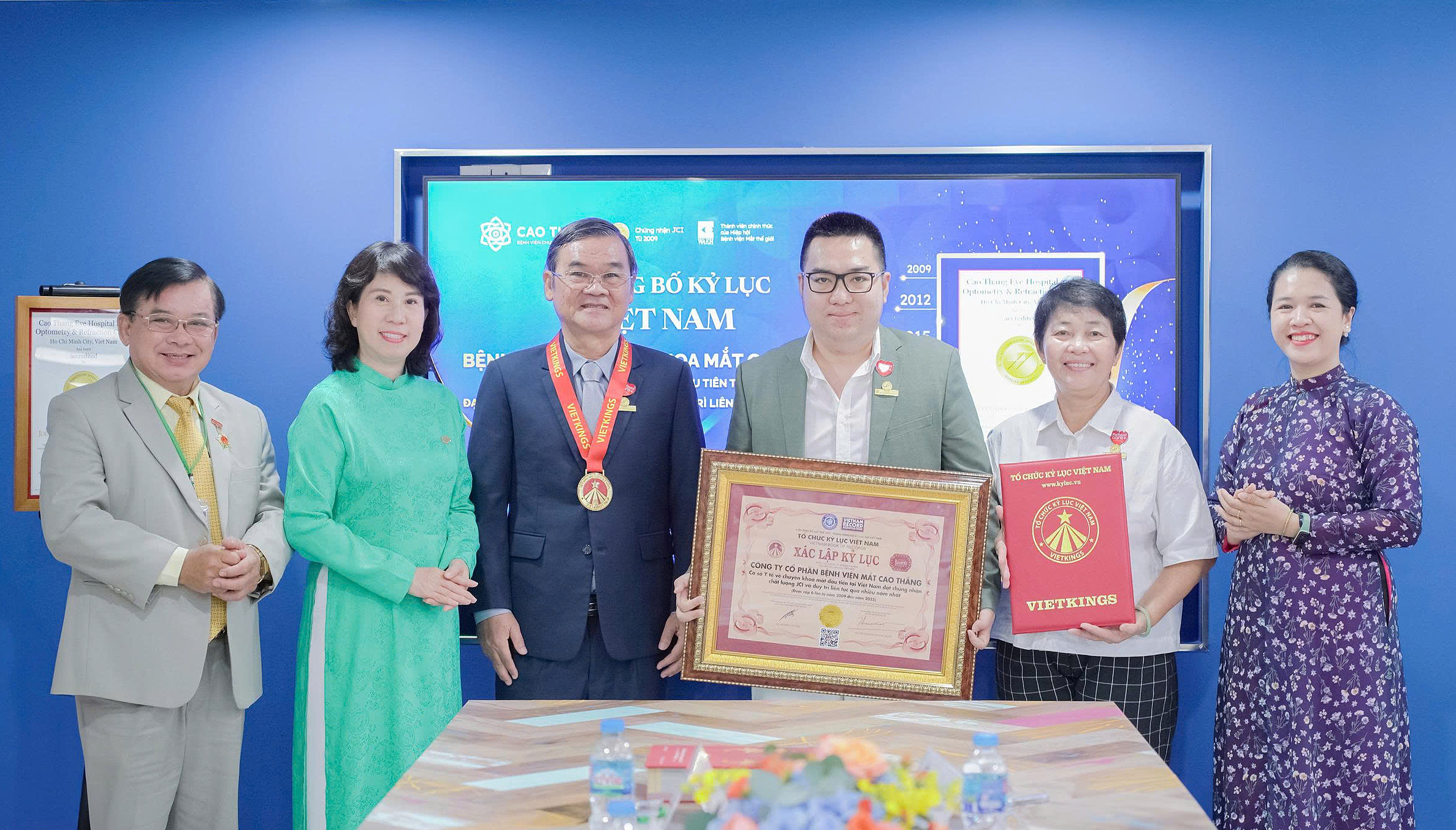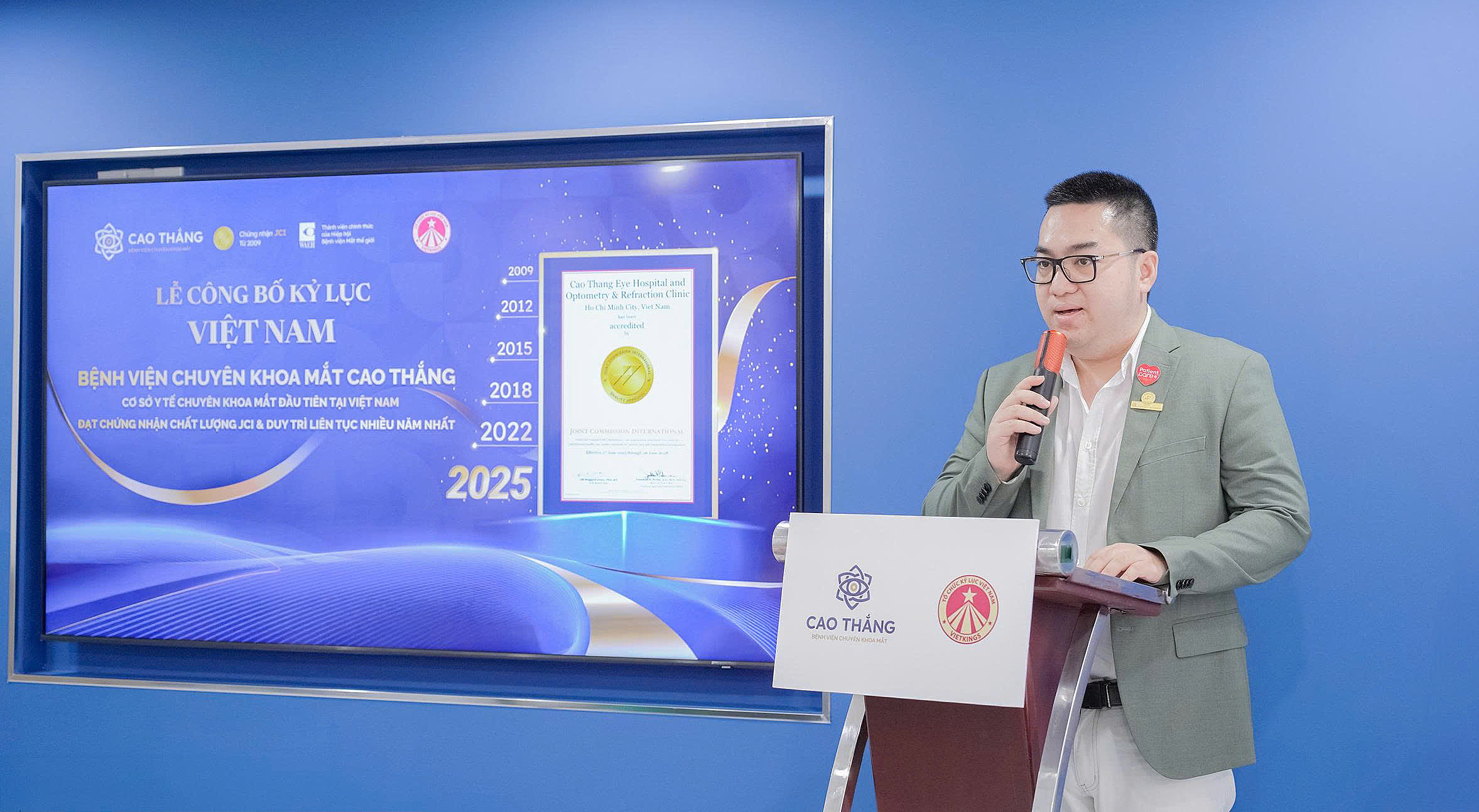On 8/8, the Vietnam Records Organization (VietKings) awarded Cao Thang Eye Hospital the title of "The first ophthalmology facility in Vietnam to achieve and maintain JCI accreditation for the most consecutive years". Cao Thang Eye Hospital has received JCI accreditation 6 times, continuously from 2009 to 2025. This July, the hospital achieved its 6th consecutive JCI accreditation for patient safety and hospital quality.
 |
The hospital's board of directors received the decision and Vietnam Record certificate from the Vietnam Records Organization, morning of 8/8. _Photo: Hospital provided_ |
In 2009, Cao Thang Eye Hospital was the first specialized eye hospital in Vietnam to achieve the hospital quality standards assessed and recognized by the Joint Commission International (JCI). JCI is considered the "international gold seal" of the global healthcare industry, with over 1,200 evaluation criteria related to patient safety, treatment effectiveness, standardization of clinical procedures, and hospital management capacity at the system level.
Stemming from a sustainable development strategy, focusing on patients with the philosophy of "safety - quality - experience," Cao Thang Eye Hospital has pioneered the development of an international-standard medical model to care for Vietnamese people's health and strives to elevate Vietnamese medicine within the global healthcare system.
Speaking at the Vietnam Record-receiving ceremony, Nguyen Quoc Anh, CEO of Cao Thang Eye Hospital, shared, "For us, JCI is not just a certificate, but an operational culture for quality. We are patient-centric and always ask ourselves: How can patients be safer, better cared for, and treated more effectively?". According to him, achieving the Vietnam record for the number of JCI accreditations is the result of the collective effort of doctors, nurses, technicians, and the operational team. This is also the hospital's commitment to continuing to provide international-quality eye care services to Vietnamese people.
 |
Mr. Nguyen Quoc Anh - CEO of Cao Thang Eye Hospital speaking at the Vietnam Record announcement ceremony. _Photo: Hospital provided_ |
For over 20 years of operation, Cao Thang Eye Hospital has continuously invested in upgrading its treatment technology. The hospital is among the few eye hospitals in Vietnam equipped with leading-edge equipment such as the Zeiss VisuMax 800, Zeiss Mel90, MYAH, Femto LDv Z8, Centurion Alcon, Zeiss OCT Cirrus 6000 integrated with AI, and Zeiss IOL Master 700.
The hospital has a team of experienced ophthalmologists who have received specialized training domestically and internationally and continuously update the latest medical knowledge. 100% of the hospital's treatment, care, and infection control procedures are developed and improved to meet JCI criteria, providing safe and effective experiences for patients.
In recent years, tens of thousands of patients have been treated effectively here. Le Thi Diem (34 years old, TP HCM) developed cataracts at a very young age due to complications from lupus erythematosus treatment. "I developed cataracts due to having to use corticosteroid drugs during pregnancy to treat lupus. My vision seriously deteriorated when I was in my early thirties; I was extremely worried," she recalled. After consulting many places, Diem decided to choose treatment at Cao Thang Eye Hospital. After surgery, her vision was restored. "I am truly grateful to the hospital for the professional service, the dedicated consultation from the doctors, and the result of clear vision," Diem said.
With the philosophy "One pair of eyes for a lifetime," the hospital continuously expands its specialized eye care services, including: refractive surgery with modern AI-integrated laser technology: Smile Pro AI 4.0, Smile Pro, Presbyond Pro; cataract treatment with AI-integrated technology and high-quality IOLs from reputable brands worldwide; and treatment of retinal and other eye and fundus diseases. The hospital has also established a Personalized Myopia Control Center for children with Myah equipment and advanced myopia treatment and management procedures such as Ortho-K, myopia control lenses, and 3D/4D vision training.
A hospital representative said that in the future, they will continue to expand international cooperation, invest in and apply advanced medical technologies to care processes, aiming for outstanding patient experiences.
Kim Anh












